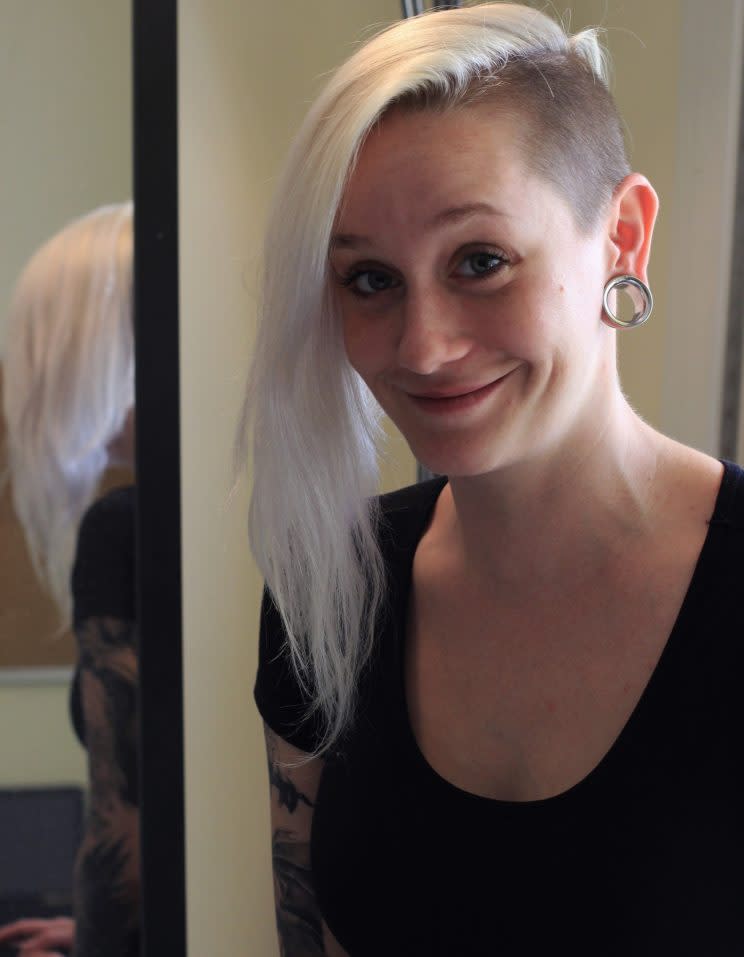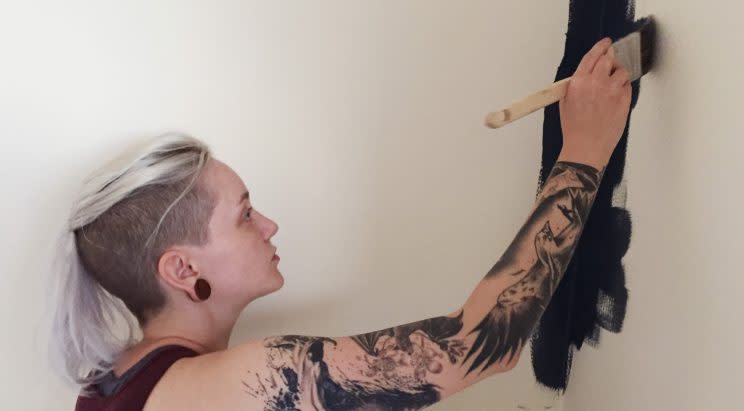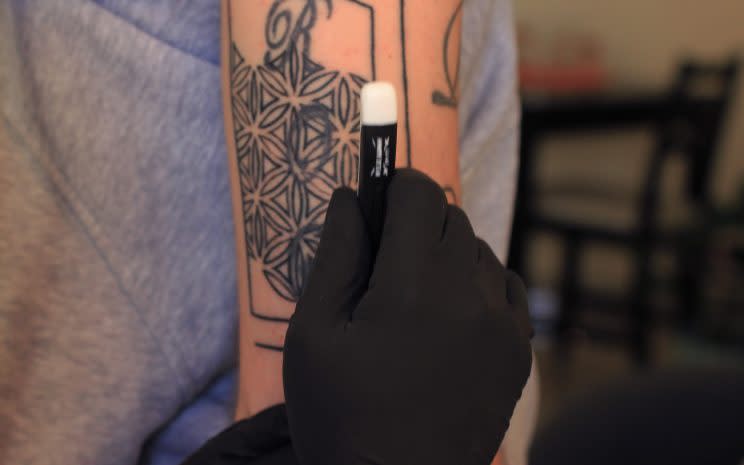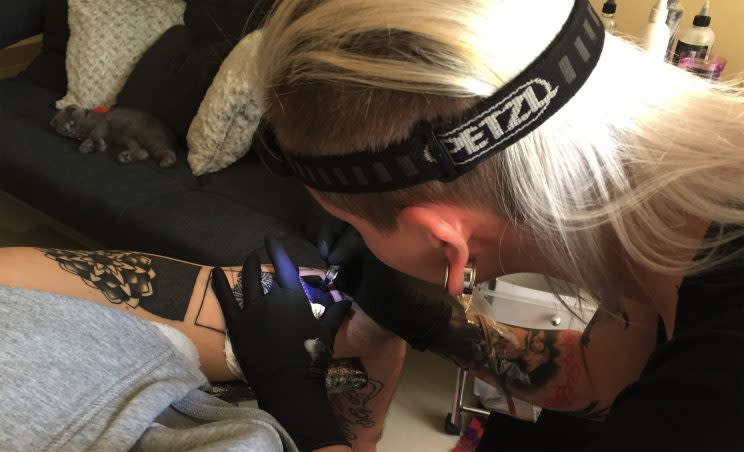The American Woman Inking ‘Forbidden’ Tattoos in Northern Iraq
ERBIL, IRAQ — Two hours away from Islamic State-controlled territory in northern Iraq, where Iraqi forces are closing in, an American woman from Texas, Shara Kenworthey, 28, sits with a needle in her front room bent over a client, tattooing his skin.
She has been running her own studio and tattoo business for nearly two years, after first arriving as an English teacher, never thinking her artistic hobby would lead her to a dream career in a place known for being at war.

Kenworthey, a lean woman with stretched ear lobes, has the sides of her head shaved and a punky blonde bun piled on her head and a sleeve of tattoos on her arm. She has so far experienced two bombing incidents in Erbil.
“It was quite scary,” she admitted of the first explosion, and for the first time, she realized she wasn’t in a glistening, tourist-driven habitat.
Of course bombs and constant conflict aren’t the only risks that come with tattooing in a country that’s majority Muslim, a religion that largely considers getting inked forbidden, or, in Arabic, haram. Many of Kenworthey’s clients are Muslim, and though most are men, some of the women who have come to her arrive at the request of their husbands — or privately — as tattooing is still not accepted by their families.

One of her clients, Omar, agreed to speak with Yahoo Beauty about getting his ink. Omar does government work and could not disclose his last name. And he explained the reason behind the belief that tattoos are haram. “Muslims pray, and before you pray, you have to wash,” he said, “And because the tattoo is under your skin,” it cannot actually be cleaned off your body.
Viewpoints among Muslims in Iraq vary on the acceptability of a tattoo and are more accepted in the Kurdish region than among Iraqis of Arab ethnicity.
While tattoos have become more common in northern Iraq, they weren’t always considered a forbidden practice. Some female adherents of the ancient Yazidi religion still practice tattoo rituals, making their own ink and applying small dots on their knuckles and hands.

Omar believes the controversy around the practice could be more of a cultural tradition than a religious one. When he got his first tattoo in Turkey, he was on a vacation with his friends, and they each got their astrological sign; his was Capricorn.
Worried how his family would react, the young man decided to act preemptively and put a photo on social media. “It’s not unacceptable, so what I had to do is take a picture of the tattoo, and put it on Instagram,” he said, “where my relatives and my family all could see it.” That way, it would lessen the sting of them finding out in person.
Omar said his family’s disapproval didn’t last long, “When I came back from Turkey, the first thing I asked my mom is if she had any ointments,” he recalled. “She was kind of mad in the beginning, then she got used to the idea.”
He would later credit Kentworthey’s artistry for his family’s acceptance.

When Kentworthey first arrived in Iraq, tensions between armed groups were not as high, and ISIS wasn’t yet a powerful force. She came in 2013 through an English teaching program called the British International Institute. After teaching in Thailand she decided she needed a change and moved to this Kurdish-controlled city.
Later that year, a car bomb went off in Erbil’s center, near government buildings and close to school where Kenworthey taught. Though the experience rattled her, the adult students in her class understood the situation and helped put her at ease — because for many in Iraq, conflict between political factions and armed groups isn’t new, and people have adapted.
After a few months, Kenworthey left the school to work at a café in a Christian-majority neighborhood called Ankawa, in Erbil. During her time there, she designed a tattoo for a friend. “It was a big intricate drawing, I spent weeks on [it],” she said. When others around her took notice of her artwork, they encouraged her to pursue tattooing as a career.

She wound up training with a Lithuanian tattoo artist and his British colleagues in 2015, when they opened a shop in Erbil. “I left my job and devoted myself full-time to tattooing,” she explained. “Traditionally, tattoo artists will practice inking on pig skin. We didn’t have that. I would walk to the studio every day and pass by a fruit shop, and I would pick up a bag of oranges and a bag of grapefruits and I would show up and I would tattoo on fruit. ”
A month later, another explosion went off near the tattoo studio in Ankawa, just outside the entrance of the U.S. Consulate. Kenworthey heard the loud boom; she looked outside and saw heavy plumes of smoke. “The front of the old studio was all windows,” she said. “I remember we were sitting there, [in the studio] and we heard this explosion and all of the windows shook. We were worried the whole wall was going to come down.”

She described the sounds as “eerie,” and didn’t expect the smoke to be so close. (Members of ISIS were later blamed for the attack.)
Kenworthey immediately called her mother, but she had no desire to return home, explaining that she “left the States” to experience cultures that were different than her own cultural “bubble.”
Since then, Kurdish Iraqi forces, known as Peshmerga, have heavily guarded Erbil, and there have been no major attacks. Kentworthey’s apprenticeship lasted two months before the other artists left her to run the shop on her own. Eventually the studio closed due government licensing complications, and she has since been tattooing from her living room, looking forward to the day that she can open a new home studio.
Omar hopes to get new tattoos from her as well. He went to Kenworthey to add more to that first astrological tattoo he got in Turkey, and said, “She’s an amazing artist, she’s amazing in her work. Right now, she’s well known in Erbil. It’s not like I need it, it’s that I like it. And I’m going to have more tattoos.”
That works for Kenworthey. As the only known female tattoo artist in Iraq, she sees her newfound career as an opportunity to make a difference — by spreading new art and beauty in a war-torn culture.
Read more from Yahoo Beauty + Style:
Bullies and Their Victims Are More Likely to Want Plastic Surgery
People Who Regularly Tan Are Likely to Have Other Addictions
There’s a Scientific Way to Leave Your Work Frustrations at the Office
Follow us on Instagram, Facebook, and Pinterest for nonstop inspiration delivered fresh to your feed, every day. For Twitter updates, follow @YahooStyle and@YahooBeauty.

